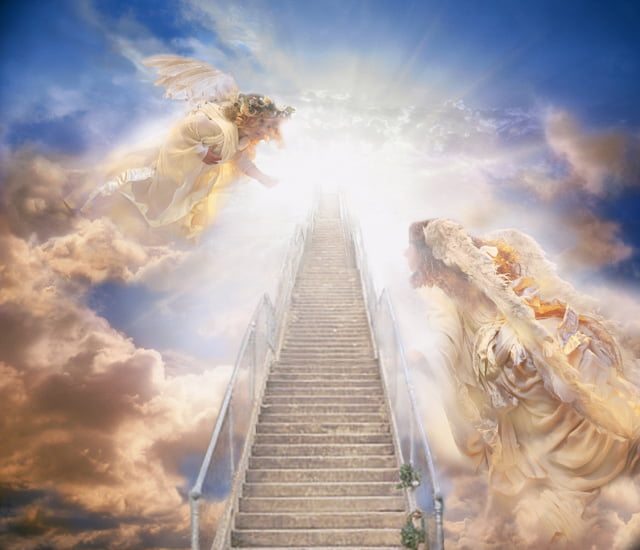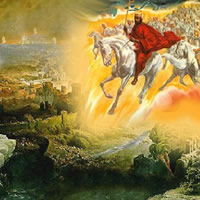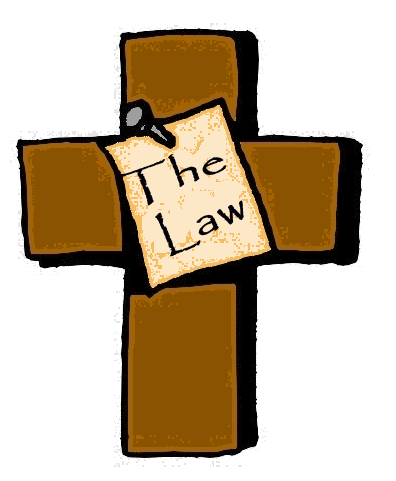Like unto the theory of saints frolicking in heaven after death; it is also believed that sinners, after death, will be tormented in a place called hell. The Scriptures seem to be very clear on the fact that there is in fact a place called hell. There are several scriptures that speak about it. In order for anyone to deny the existence of hell, such a person would have to deny the infallibility of the Bible altogether. The Bible does in fact speak about a place called hell; but is it really a place of brimstone and fire as many believe? Will sinners burn in this hell forever and ever?
What Is Hell?

A very interesting use of the word hell is seen in Psalm 16:10 KJV. David, in this Psalm, confidently expressed a holy person going to hell, then being rescued from hell by Yahweh. How can this be true if hell is a place where sinners will burn forever? If that is not confusing enough, Luke, in Acts 2:27,29,30 KJV, later revealed that this "holy person" was Yahshua the Messiah. The very Son of Yahweh was in hell!!! The holy Messiah was in this place call hell. In addition to all that, Jonah, a well-known prophet, also confessed to being in hell in Jonah 2:2 KJV. The fact that all these righteous people could have gone to hell, some even returning from hell and none mentioning anything about burning, shows evidently that hell is not a place where sinners will burn forever and ever. What then is this place call hell?
The word hell was used some 54 times in the Bible (31 in Hebrew manuscripts, and 23 in the Greek). A total of four words in the Bible has been translated into what is now seen as "hell". From the Hebrew manuscripts is the word sheol which refers to the grave, and from the Greek manuscripts are: hades, Gehenna and tartaroo. Hades is the Greek equivalent to sheol which means the grave. Gehenna means "valley of Hinnom", and it is a physical place in Jerusalem (a garbage dump). Tartaroo is translated "deepest abyss of Hades", and it speaks to a form of incarceration. None of these words mean a place of fire and brimstone, hence hell is NOT a place of fire and brimstone. Observe how the Bible uses each of the words translated in "hell":
- Sheol - Isaiah 14:15 KJV. In this scripture the words hell and pit are used synonymously depicting the grave.
- Hades - Revelation 20:13 KJV. Note that death and hell gave up the DEAD that was in them, that is, the dead bodies. This again, is a depiction of the grave.
- Gehenna - Matthew 18:9 KJV. This is the only word that associates hell with fire, and it is because Gehenna is a garbage dump, hence there is alway fire in this hell.
- Tartaroo - 2 Peter 2:4 KJV. Note that in Revelation 12:9 KJV it stated that the devil was cast to the EARTH. Peter used the word hell or tartaroo to describe their state of incarceration, not their place of dwelling. The devil and his legion dwells here on earth Revelation 12:12.
Hell generally means the grave. It is often used in reference to a pit, or even a hole, but it generally speaks to the literal grave in the ground. In any event, the word hell is used to describe a physical place and not a spiritual inhabitant. When David said Yahweh will not leave "his" soul in hell in Psalm 16:10 KJV, he was talking about the grave. David knew that after the Messiah had died and was buried, he will three days after, be resurrected, hence David said he will not stay in hell - that is, the Messiah will not stay in the grave (Acts 2:29-30). Yahshua the Messiah was not burning in hell for three days and three nights, but rather he was laying in a tomb. This was the only "hell" he went to - the grave! Jonah was in the belly of a fish Jonah 2:1 KJV, yet he said he was in hell Jonah 2:2 KJV. Jonah was in what he felt was a dark pit, hence the use of the word hell. Should one dig a hole to build a well or a tunnel, then that hole can also be rendered as hell.
The Ever-Burning Hell
Admittedly the English version of the Bible does paint the picture of an ever burning hell if it is not read in context. Unlike other languages where various words are used to express the various meanings; in the English language, only the word hell is used. Therefore whether a garbage dump, a grave or a form of incarceration is being spoken of, the only word used in English is "hell". This was what gave birth to the misunderstanding of what hell really is.
Yahshua gave the idea of an ever-burning hell in Mark 9:43,45 and 47. He warned the people of Jerusalem about being cast into hell fire. Each time he spoke of this "hell fire" however, he recited this jingle "where the worm does not die, and the fire is not quenched" Mark 9:44 KJV, Mark 9:46 KJV and Mark 9:48 KJV. Some Bible translations, not recognizing the importance of this jingle, omits the repetition. This jingle is found in Isaiah 66:24, and it explains what the Messiah was saying. Yahshua combined two things to make his point. Firstly Gehenna (hell), a place they were all familiar with; and then the Scriptures, something they did not quite understand. Every Jew in Jerusalem knew what and where Gehenna was. It was not a pleasant place. From the constant supply of garbage disposals and dead bodies, Gehenna seems to always be on fire. The Jews understood this concept, thus Yahshua used it to demonstrate what his return would be like as seen in Isaiah 66:15-24. Gehenna was used to explain the Lake of Fire.
Most people confuse hell with the Lake of Fire, others believe that the Lake of Fire is somewhere in hell. None of these can be true as hell itself will be cast into the Lake of Fire as seen in Revelation 20:14 KJV. The Lake of Fire is a physical structure that will be ignited on earth when Yahshua returns. In this Lake will be the destruction of evil (people and spirits alike). The punishment for sin is destruction or death as seen in John 3:16 and Romans 6:23. The gift of Yahweh is eternal life (this means to be alive forever), and the punishment of sin is death (this means to be dead forever). It is either man will be alive forever or dead forever; not alive in heaven or alive in hell. If that were the case, then everybody would have had eternal life. This, of course, would make the scriptures invalid as the scriptures teach that the gift of Yahweh is eternal life, and ONLY those who are saved will inherit this. The idea of sinners being DEAD as punishment is supported by Revelation 20:14 which shows that the Lake of Fire is the second DEATH. One cannot be dead and burning forever at the same time - that is preposterous! It is either the soul is dead or burning forever. The Scripture says it will be dead! (Ezekiel 18:4, Malachi 4:1)
The fact that scriptures say sinners will burn forever and ever does not convey an eternity of burning, but rather, burning that cannot be quenched by intervention. This fire is one that will burn until everything is fully consumed by its blaze - regardless of how long that may be. This is supported by Malachi 4:1 - nothing will be left of sinners! Once the fire has consumed everything in its path, then it will self-extinguish. A perfect example of this is seen in Jeremiah 17:27. Yahweh warned the Israelites that if they did not listen and keep the Sabbath, then He will kindle an unquenchable fire at the gates. The Israelites did not listen, and the prophesy was fulfilled in Jeremiah 52:13. Although Yahweh said the fire would be unquenchable - which it really was - it did not last for eternity. Once the fire has consumed all that was to be destroyed, it self-extinguished. This is the same for the Lake of Fire. The purpose of the Lake of Fire is to utterly destroy evil. This purpose would become futile if sinners will exist for all eternity. The choice which Yahweh has given to man is to either live or die (Deut.30:19); not to live in heaven or to live in hell. Yahweh does not take pleasure in the destruction or torment of man, hence whosoever will not obey Him, he will simply get rid of.
In Revelation 21:1, it is seen where Yahweh created a new heaven and a new earth. If sinners were to burn forever, where in this brand new world of perfection would hell or the Lake of Fire be? Revelation 21:4 shows evidently that hell has no part in this new world. Hell and the Lake of Fire will be filled with death and crying. These are the very things that John said will exist no more. Evidently therefore hell and the Lake of Fire will cease to exist at this point in time. It is impossible to have peace and tranquility in a world where people are constantly burning and crying out in pain and torment. The Bible can never contradict itself, so evidently this idea of an ever-burning hell is not true, and certainly not of Yahweh.
Hell, therefore is NOT a place of fire and brimstone - the Lake of Fire is. This Lake of Fire is NOT eternal, but will eventually cease to exist (once its purpose is fulfilled). Sinners will not burn in hell for all eternity, but will be utterly destroyed in the Lake of Fire. They will be destroyed because they refused yo live righteously, hence they cannot be a part of a righteous world. Should Yahweh allow people who cannot obey his law into the new world, then there will be another Lucifer story all over again. For this reason, every disobedient, law-resenting soul will be utterly destroyed and remembered no more. This was what Yahweh promised in Ezekiel 18:4. Note that Yahweh did not say these souls will not be tormented forever, but rather, that they will DIE!!! The wages of sin is DEATH - sinners will not be tormented forever, but will be utterly DESTROYED.
The Voice of Yahweh has spoken ... He that has an ear, let him hear what the Spirit says to the Churches





